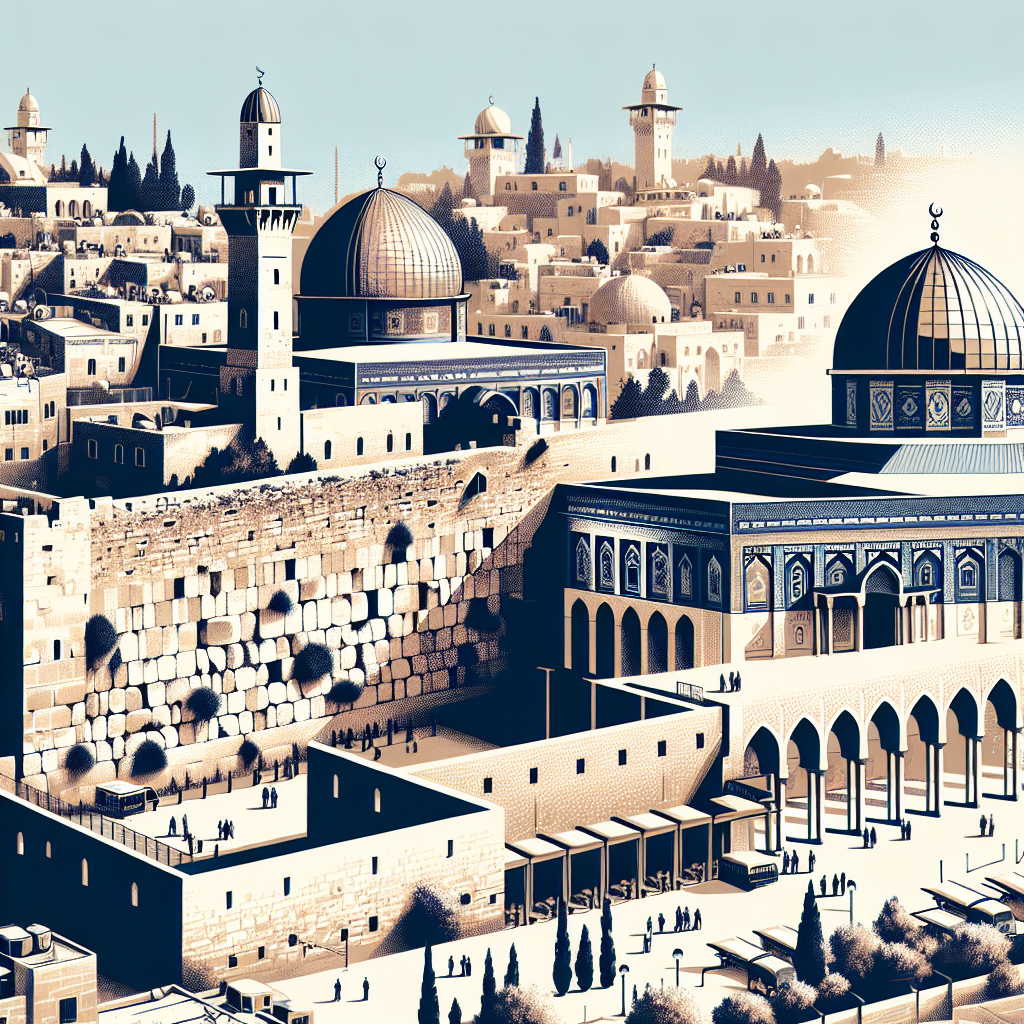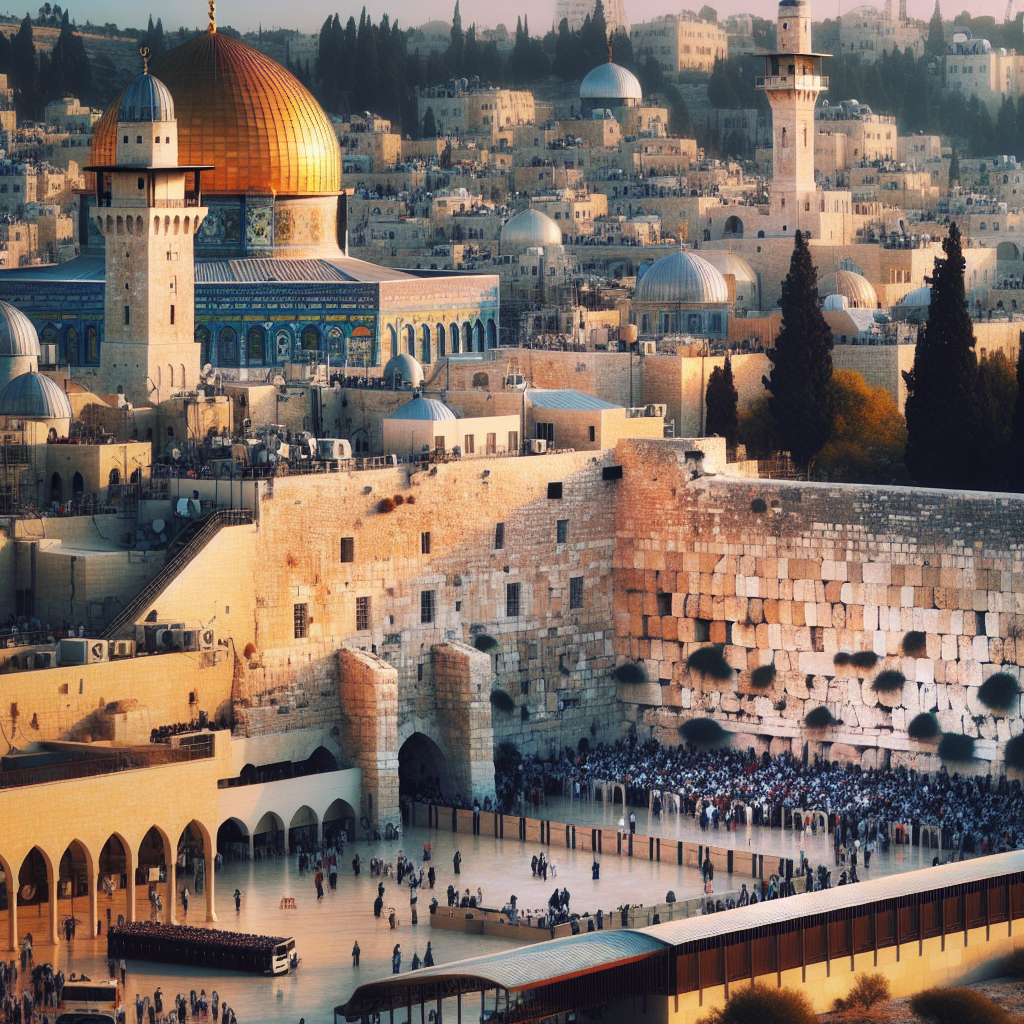In this article, we’ll be exploring the significance of two iconic religious sites: the Western Wall and the Al-Aqsa Mosque. These cherished locations hold immense historical and cultural importance, particularly for the Jewish and Islamic communities. By delving into their historical narratives and understanding their significance to each respective faith, we can gain a deeper appreciation for the rich tapestry of these religious landmarks. So, let’s embark on a fascinating journey to uncover the significance behind the Western Wall and the Al-Aqsa Mosque.
Historical Significance
Biblical Importance
The significance of the Western Wall and the Al-Aqsa Mosque can be traced back to biblical times. For the Jewish people, the land of Israel holds deep religious and historical importance. According to biblical narratives, the land of Israel was promised to the Jewish people by God, and it is considered their ancestral homeland. This biblical connection to the land strengthens the Jewish people’s attachment to sites like the Western Wall and the Al-Aqsa Mosque, as they are believed to have been directly connected to biblical stories and figures.
Cultural History
The cultural history of Israel is rich and diverse, with influences from various civilizations and empires throughout the ages. The land has been a crossroads of cultures, religions, and trade routes, shaping its cultural heritage. The Jewish people have a long and enduring cultural history in the land, with traditions, customs, and practices that have been passed down through generations. The Western Wall and the Al-Aqsa Mosque are both significant landmarks that have witnessed centuries of cultural interactions and have become important symbols of this history.
Return to the Homeland
One of the key historical events for the Jewish people is the return to their homeland after centuries of exile and diaspora. The establishment of the modern State of Israel in 1948 marked a significant milestone in Jewish history, as it provided a safe haven for Jews from around the world. This return to the land of Israel holds immense historical significance for Jews, as it fulfilled a long-standing dream of regaining sovereignty and rebuilding their national identity. The Western Wall and the Al-Aqsa Mosque serve as reminders of this triumphant return and continue to hold a special place in the hearts of the Jewish people.
Jewish Connection to the Land
Religious Significance
The land of Israel holds profound religious significance for the Jewish people. It is considered to be the land that God promised to the Jewish patriarchs, including Abraham, Isaac, and Jacob. Many important biblical events took place in this land, such as the Exodus from Egypt, the receiving of the Ten Commandments on Mount Sinai, and the establishment of the Kingdom of Israel under King David and King Solomon. The Western Wall and the Al-Aqsa Mosque are both associated with these biblical events, making them sacred sites for Jewish worship and pilgrimage.
Symbol of Unity
The land of Israel serves as a symbol of unity for the Jewish people. Despite their dispersion throughout the world, Jews have maintained a strong connection to their ancestral homeland. The Western Wall, also known as the Wailing Wall, has become a powerful symbol of Jewish unity and resilience. It is a place where Jews from different backgrounds and denominations come together to pray, affirming their shared history and identity. The Al-Aqsa Mosque, although primarily associated with Islam, is also considered a symbol of unity for the wider Muslim community.
Pilgrimage Site
The Western Wall and the Al-Aqsa Mosque are both important pilgrimage sites for Jews and Muslims, respectively. For Jews, the Western Wall is the holiest site where they can directly connect with the remnants of the Second Temple. Thousands of Jewish pilgrims flock to the Western Wall, especially during significant holidays and occasions, to pray and offer their supplications. Similarly, the Al-Aqsa Mosque holds great religious importance for Muslims, as it is believed to be the third holiest site in Islam after Mecca and Medina. Muslim pilgrims from around the world visit the Al-Aqsa Mosque to participate in prayers and engage in spiritual reflection.
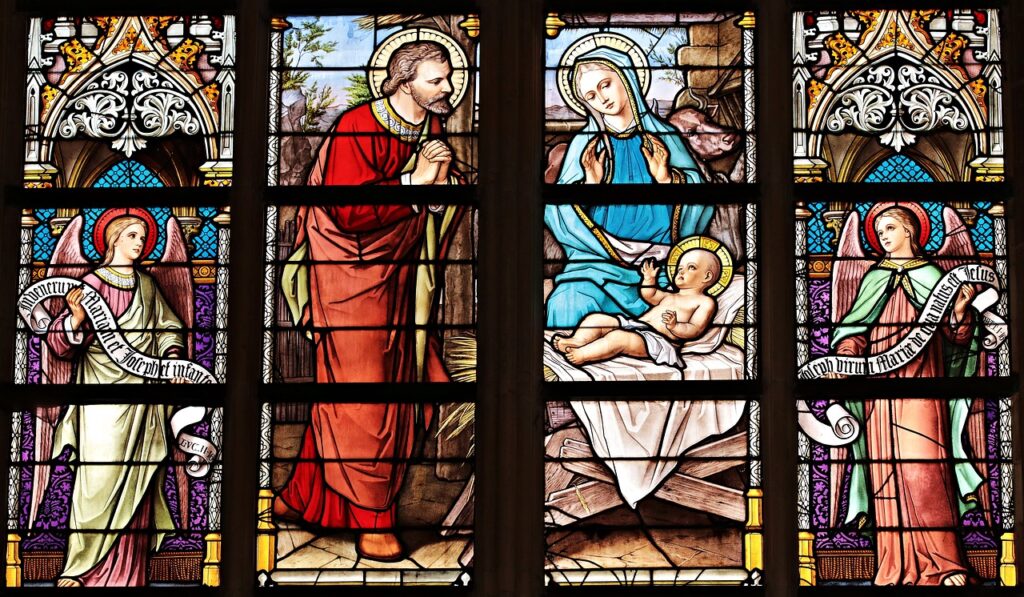
The Western Wall
Historical Background
The Western Wall, also known as the Wailing Wall, is a remnant of the Second Temple complex in Jerusalem. It is a significant historical site for Jews, as it is believed to be the closest accessible location to the Holy of Holies, the most sacred area of the Temple. The Second Temple was destroyed by the Romans in 70 CE, but the Western Wall survived and has since become a focal point for Jewish worship and reverence.
Religious Significance
The Western Wall is considered the holiest site for Jews around the world. It is believed to be the place where the divine presence of God still resides, making it a powerful location for prayers and spiritual connection. Jewish worshipers gather at the Western Wall to recite prayers, lament the destruction of the Temple, and express their hopes for the rebuilding of the Third Temple. The wall itself is seen as a bridge between the earthly and the divine, a place where Jewish people can approach God with their deepest desires.
Symbol of Jewish Identity
The Western Wall is not only a religious site, but also a symbol of Jewish identity and resilience. Despite centuries of exile, persecution, and displacement, the Western Wall has remained standing as a testament to the enduring faith and connection of the Jewish people to their homeland. It serves as a reminder of the rich history and cultural heritage of the Jewish people, instilling a sense of pride and unity among Jews worldwide.
Political Relevance
The Western Wall is not exempt from political tensions and controversies. Its location in the Old City of Jerusalem, a site of historical and geopolitical significance, has made it a focal point in the Israeli-Palestinian conflict. Various political actors and movements, both within Israel and internationally, lay claim to the Western Wall and its surroundings. The Western Wall has become entangled in debates over sovereignty, religious freedom, and the future of Jerusalem.
Al-Aqsa Mosque
Historical Background
The Al-Aqsa Mosque is located within the larger Al-Haram al-Sharif (Noble Sanctuary) complex in the Old City of Jerusalem. It is believed to have been constructed in the 8th century CE, making it one of the oldest existing Islamic structures in the world. The site has a rich historical background, with traces of earlier religious structures and civilizations, including a Jewish Temple and a Roman garrison.
Religious Significance
The Al-Aqsa Mosque holds great religious significance for Muslims worldwide. It is considered the third holiest site in Islam after Mecca and Medina. According to Islamic tradition, the Prophet Muhammad embarked on a miraculous night journey from Mecca to Jerusalem, where he ascended to heaven. The Al-Aqsa Mosque is believed to be the place where the Prophet Muhammad led prayers with other prophets and received divine revelations. For Muslims, the Al-Aqsa Mosque represents a sacred space for prayer and worship.
Symbol of Islamic Heritage
The Al-Aqsa Mosque, as part of the larger Al-Haram al-Sharif complex, is an important symbol of Islamic heritage. The mosque stands as a testament to centuries of Islamic presence and influence in Jerusalem and the wider region. It serves as a place of spiritual and cultural significance, fostering a sense of identity and belonging among Muslims worldwide.
Political Tensions
Like the Western Wall, the Al-Aqsa Mosque is not immune to political tensions and conflicts. Its location within the contested Old City of Jerusalem, claimed by both Israelis and Palestinians, has made it a flashpoint in the Israeli-Palestinian conflict. The control and access to the Al-Aqsa Mosque have been the subject of political disputes, leading to tensions and violence. Protests and clashes between Israeli security forces and Palestinian worshipers have occurred, further complicating the delicate balance of power and religious significance.

Shared and Divided Space
Geographical Layout
The Western Wall and the Al-Aqsa Mosque are located in close proximity within the Old City of Jerusalem. The Western Wall is situated at the base of the Temple Mount, while the Al-Aqsa Mosque is located on the southern end of the same elevated platform. These two sites, although distinct in religious affiliation, share a physical space that holds deep symbolism for both Jews and Muslims.
Coexistence
Despite the religious and political divisions, there is a coexistence between the Jewish and Muslim communities in the area surrounding the Western Wall and the Al-Aqsa Mosque. The Old City of Jerusalem has historically been a place of diversity and interfaith interactions. Jews, Muslims, Christians, and people from various backgrounds live, work, and intersect in this shared space, fostering a sense of coexistence and mutual respect.
Religious Practices
The Western Wall and the Al-Aqsa Mosque are both places of religious practice and worship. While the Western Wall is primarily used for Jewish prayers and rituals, the Al-Aqsa Mosque serves as a place of Muslim congregational prayers and religious gatherings. These religious practices bring people together and contribute to the rich tapestry of religious life within the Old City.
Political Challenges
The shared space between the Western Wall and the Al-Aqsa Mosque also presents political challenges. The delicate balance of power and control between Israeli authorities, Palestinian authorities, and international actors has implications for access, security measures, and religious freedom. These political challenges can often exacerbate tensions and contribute to a sense of unease in the region.
Controversial Ownership
Israeli Control
Since the Six-Day War in 1967, Israel has maintained control over the Old City of Jerusalem, including the Western Wall and the area surrounding the Al-Aqsa Mosque. The Israeli government considers the area to be part of its sovereign territory and has implemented policies and security measures as it sees fit. This control has been contested by Palestinians, who claim East Jerusalem, including the Old City, as the capital of a future Palestinian state.
Palestinian Claims
Palestinians have long claimed sovereignty over East Jerusalem, including the Old City, as part of their aspirations for an independent Palestinian state. The Western Wall and the Al-Aqsa Mosque are seen as integral components of Palestinian national identity and heritage. Palestinian demands for control, access, and religious freedom in the area have been at the forefront of Israeli-Palestinian negotiations and conflicts.
International Perspectives
The ownership and control of the Western Wall and the Al-Aqsa Mosque have drawn international attention and varying perspectives. Different countries, organizations, and individuals have taken positions on the Israeli-Palestinian conflict and the status of Jerusalem. The international community has played a role in diplomatic efforts, mediation, and peace negotiations aimed at finding a resolution to the disputed ownership of the area.
Negotiation Efforts
Numerous negotiation efforts have been made to address the controversial ownership of the area around the Western Wall and the Al-Aqsa Mosque. Peace talks between Israeli and Palestinian leaders, as well as international initiatives, have aimed to find a mutually acceptable solution that respects the religious and national aspirations of both parties. The issue of ownership remains a central challenge in achieving a lasting peace in the region.
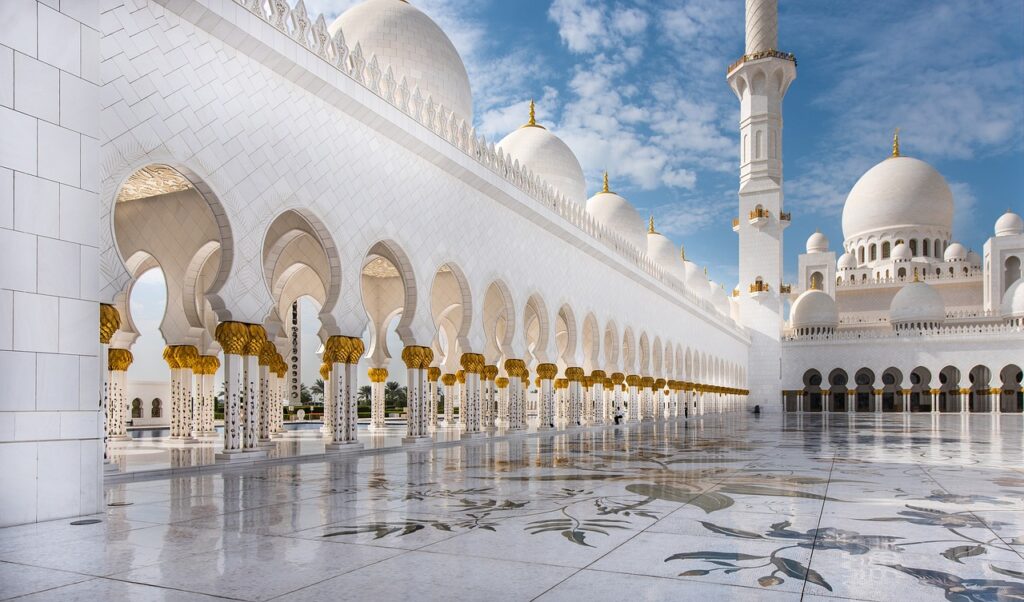
Religious Rites and Rituals
Jewish Prayers at the Western Wall
The Western Wall is a sacred site for Jewish prayers and rituals. Jewish worshipers from around the world come to the Western Wall to offer prayers, read from the Torah, and engage in personal reflection. Many significant Jewish holidays and occasions, such as the High Holy Days, Bar and Bat Mitzvah ceremonies, and the annual Tisha B’Av, are marked by special services and events at the Western Wall.
Muslim Prayer at Al-Aqsa Mosque
The Al-Aqsa Mosque is a central place of worship for Muslims. Five daily congregational prayers take place at the mosque, attracting Muslims from Jerusalem, the West Bank, and beyond. During the holy month of Ramadan, the Al-Aqsa Mosque becomes a hub of spiritual activity, with special prayers and gatherings held throughout the month.
Importance of Worship
The act of worship and prayer is central to both Jewish and Islamic traditions. By praying at the Western Wall and the Al-Aqsa Mosque, believers seek spiritual connection, guidance, and reassurance. The rituals and practices associated with these sites provide a sense of comfort, strength, and devotion to those who engage in religious worship.
Interfaith Relations
The religious rites and rituals at the Western Wall and the Al-Aqsa Mosque also present opportunities for interfaith dialogue and understanding. Despite the historical and political tensions, Jews and Muslims have engaged in joint prayer services, discussions, and cultural exchanges within the shared space of the Old City. These interactions foster mutual respect, bridge divides, and promote peaceful coexistence between different religious communities.
Political and Social Impact
Israeli-Palestinian Conflict
The Western Wall and the Al-Aqsa Mosque are not only religious sites but also symbols of the larger Israeli-Palestinian conflict. The political disputes over ownership, control, and access to these sites have contributed to the overall tensions and divisions between Israelis and Palestinians. The conflict has had a profound impact on the daily lives, aspirations, and identities of both communities, with the Western Wall and the Al-Aqsa Mosque serving as powerful symbols of their respective narratives.
National Identity
The Western Wall and the Al-Aqsa Mosque hold significant importance for both Jewish and Palestinian national identities. The Jewish connection to the Western Wall represents a longing for a united Jewish homeland, while the Al-Aqsa Mosque is a symbol of Palestinian aspirations for self-determination and statehood. The struggle over these sites reflects the broader contestation of national narratives and the quest for recognition and sovereignty.
Tensions and Violence
Unfortunately, the political and social impact of the Western Wall and the Al-Aqsa Mosque has sometimes been marred by tensions and violence. Clashes between Israeli security forces, Palestinian protesters, and militant groups have occurred, leading to loss of life, injuries, and further exacerbating the divide between the two communities. These incidents highlight the volatile nature of the situation and the need for peaceful resolutions.
International Repercussions
The Israeli-Palestinian conflict and the contentious ownership of religious sites like the Western Wall and the Al-Aqsa Mosque have reverberated beyond the borders of the region. The conflict has drawn international attention and sparked debates on issues such as human rights, international law, and geopolitical dynamics. The repercussions of the conflict have influenced diplomatic relations, foreign policies, and public opinion across the globe.
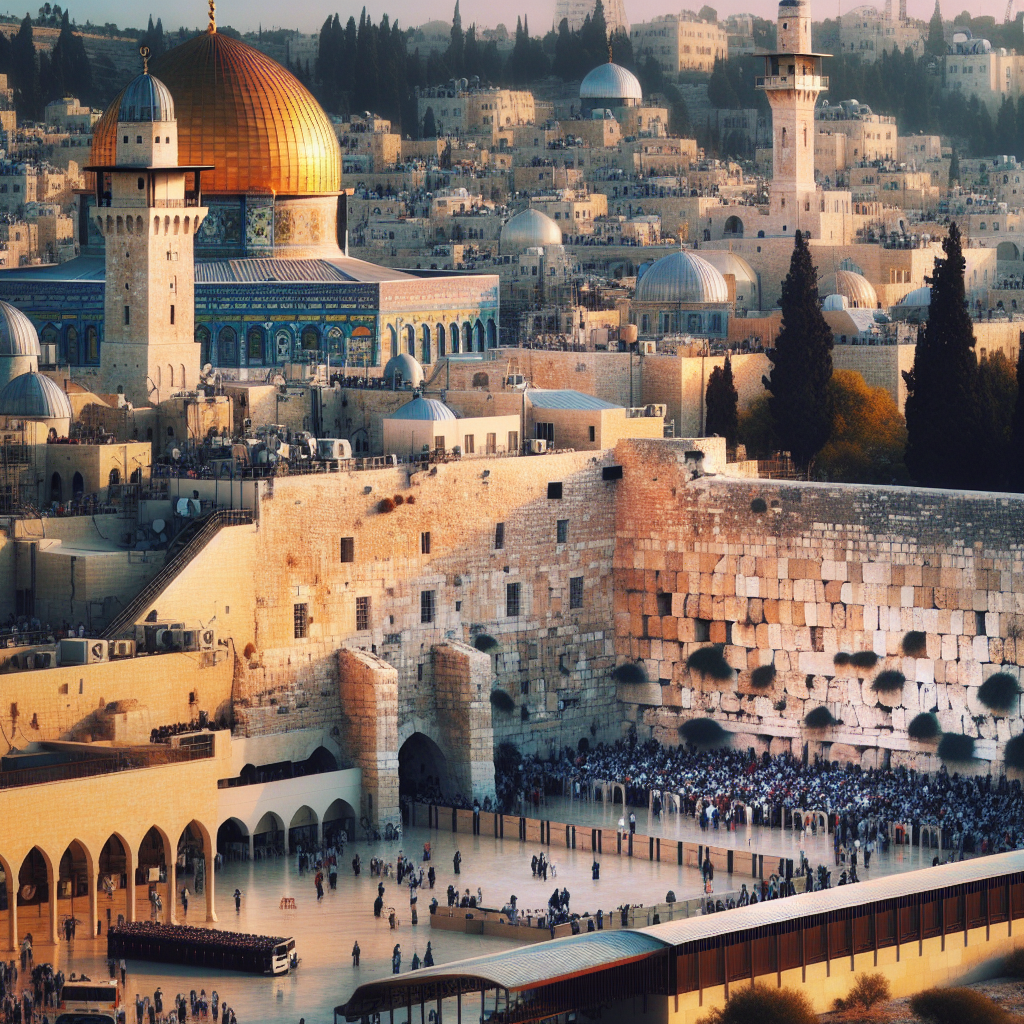
Tourism and Cultural Significance
Tourist Attractions
The Western Wall and the Al-Aqsa Mosque are major tourist attractions, drawing visitors from various parts of the world. Tourists come to these sites to experience the religious and historical significance, witness the vibrant cultural mosaic of the Old City, and gain insights into the ongoing Israeli-Palestinian conflict. The architectural beauty and cultural heritage of the Western Wall and the Al-Aqsa Mosque make them must-see landmarks for travelers.
Educational Importance
Due to their historical and cultural significance, the Western Wall and the Al-Aqsa Mosque have educational importance. Schools, universities, and cultural institutions include the study of these sites in their curriculum and educational programs. Learning about the religious traditions, historical narratives, and political complexities associated with the Western Wall and the Al-Aqsa Mosque contributes to a better understanding of the region and its dynamics.
Preservation Efforts
Preserving the Western Wall and the Al-Aqsa Mosque is of utmost importance to ensure their continued cultural and historical significance. Various organizations, governmental bodies, and religious institutions are involved in ongoing preservation efforts, which include architectural restoration, archaeological research, and the implementation of appropriate conservation practices. These initiatives aim to safeguard the integrity and authenticity of these sites for future generations.
Promoting Peace and Understanding
The Western Wall and the Al-Aqsa Mosque, despite their contentious nature, also present opportunities for promoting peace and understanding. Cultural exchange programs, interfaith dialogues, and educational initiatives that focus on these sites can foster mutual respect, empathy, and dialogue between different communities and promote a better understanding of each other’s narratives and aspirations. By highlighting the shared cultural heritage and the significance of these sites to multiple religious traditions, efforts can be made to bridge divisions and promote peaceful coexistence.
Hope for Reconciliation
Cooperative Initiatives
Numerous cooperative initiatives have aimed to foster reconciliation between Israelis and Palestinians, including around the Western Wall and the Al-Aqsa Mosque. Interfaith prayer services, joint cultural events, and peace-building programs have brought Jews, Muslims, and Christians together to promote dialogue, understanding, and peaceful coexistence. These initiatives serve as beacons of hope, demonstrating the potential for reconciliation and collaboration.
Dialogue and Understanding
Dialogue and understanding are essential elements in achieving reconciliation. By engaging in open and respectful conversations, Israelis and Palestinians can humanize one another, recognize shared values and aspirations, and acknowledge the importance of religious sites to both communities. Dialogue platforms that encourage listening, empathy, and mutual respect can help break down barriers and build bridges even in the face of deeply entrenched conflicts.
Religious and Cultural Exchange
Religious and cultural exchange programs provide opportunities for Israelis and Palestinians to learn from each other’s traditions, practices, and histories. Joint visits to the Western Wall and the Al-Aqsa Mosque can foster appreciation and respect for the shared sanctity and significance of these sites. By exploring each other’s cultures and religious customs, commonalities can be discovered, strengthening the bonds of humanity and opening avenues for reconciliation.
Achieving Peace
Achieving a lasting and just peace between Israelis and Palestinians remains a complex and multifaceted challenge. However, the Western Wall and the Al-Aqsa Mosque represent potential starting points for dialogue and understanding. By recognizing the religious and cultural importance of these sites to all parties involved, efforts can be made to find inclusive solutions that respect the beliefs, rights, and aspirations of Israelis and Palestinians. Peace can only be achieved through genuine dialogue, mutual respect, and a commitment to finding common ground.
